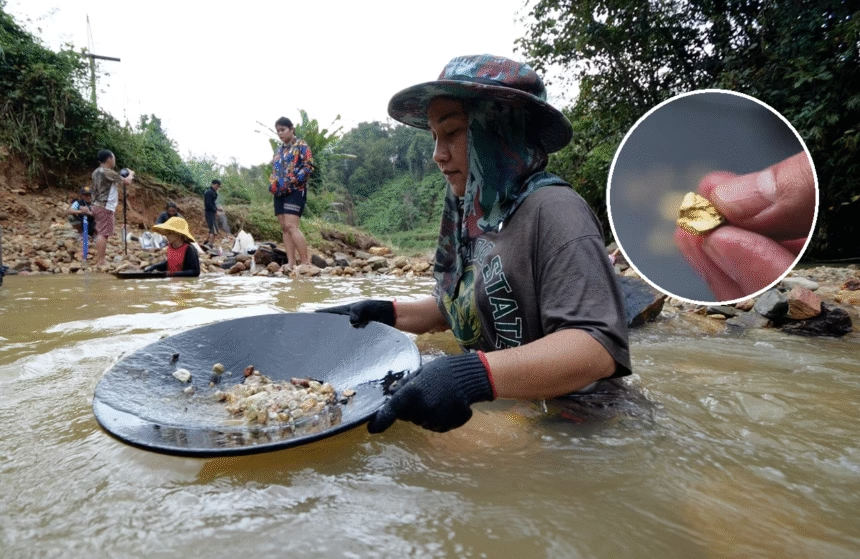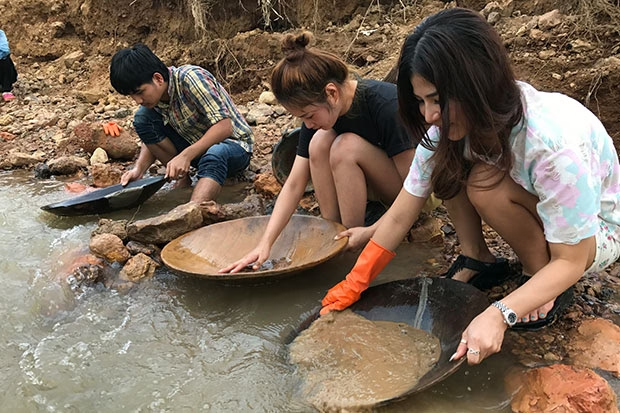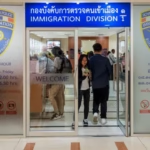CHIANG RAI – In the mist-covered hills of Chiang Rai, where the Kok River winds like a thin silver ribbon through bright green rice fields and long-standing hill tribe villages, quiet talk of hidden wealth is drawing hopeful visitors.
Many travellers still come for the white splendour of Wat Rong Khun or plates of spicy sai ua sausage. Yet a growing number arrive for something older and simpler, the promise of gold panning.
This search for gold feels timeless, almost as old as the surrounding mountains. As Chiang Rai and the wider region rebuild after the pandemic, both residents and adventurous foreigners are stepping into cool streams, swirling pans filled with gravel, and hoping for tiny pieces of yellow metal that might change their fortunes.
The question hangs in the air: can this small-scale rush last, and where do Thai laws leave those eager expats with gold pans in hand?
Gold Panning in Thailand: A Long Tradition
Gold panning in Thailand is far more than a modern pastime. It forms part of the country’s history and everyday life in some communities. People have washed riverbeds for gold for generations, taking advantage of the kingdom’s rich geology.
Gold deposits scatter across the country like secret pockets of wealth, from northern granite highlands to southern plains built by rivers. Data from the Department of Mineral Resources lists more than 76 known gold sites in 31 provinces.
Many of these are placer deposits, loose gold particles carried by water, often the most suitable form for basic panning.
Thai gold does not often appear as large nuggets. It usually shows up as fine grains or dust that demand patience, a steady hand, and a sharp eye. That patience can pay off. With global prices hovering near 2,500 baht per gram in late 2025, even finding a single gram each day can turn a marginal income into a more comfortable one.
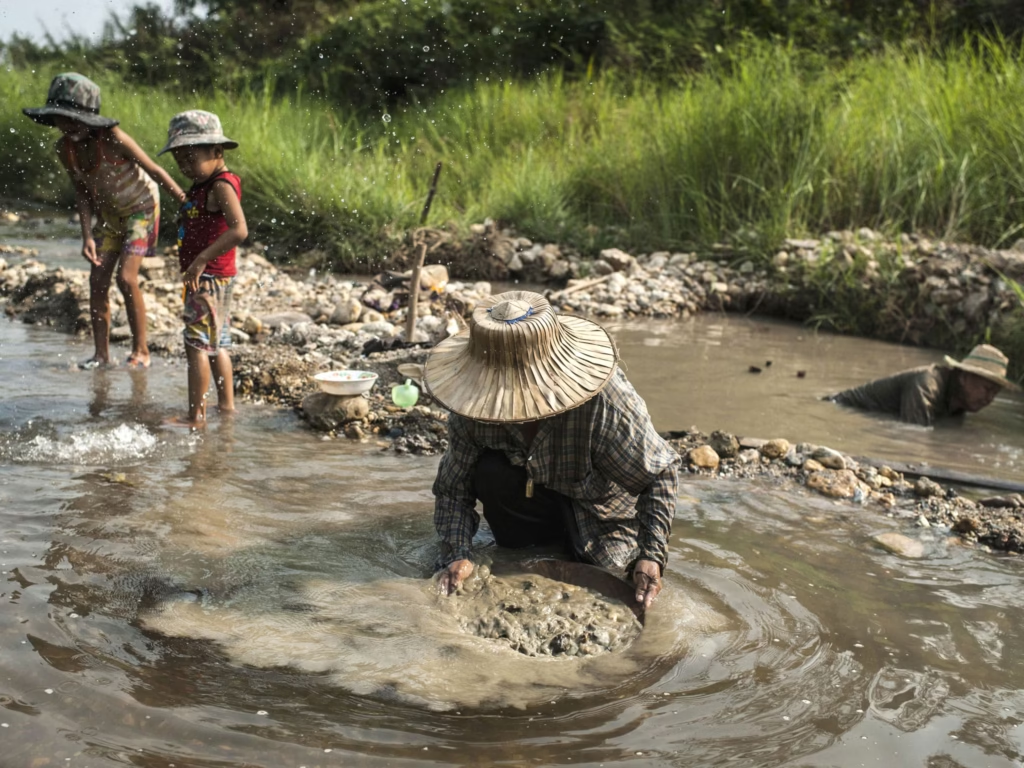
How Traditional Gold Panning Works
At its core, panning requires only a few simple tools and plenty of effort. A wide, shallow pan, a shovel, and a good sense of where gold might settle are enough to start. Prospectors wade into clear, shallow stretches of river, scoop a mix of sand, gravel, and small stones into their pans, then swirl it in water using steady circular motions.
The light material drifts away with the current. Heavier particles, including gold, sink and stay near the bottom of the pan. The work is slow, physical, and often hard on the back. Many start at dawn when the rivers are quiet and less cloudy.
In areas where people care about long-term use of the river, panners avoid chemicals such as mercury. This simple, low-tech approach protects fish, insects, and plants that depend on clean water. Environmental groups support such methods, but still warn that large numbers of panners can damage riverbanks, stir up silt, and stress fragile ecosystems if no rules exist.
COVID-Era Surge: Gold Instead of Tourists
Across Thailand, interest in small-scale gold panning climbed sharply during the COVID-19 years. As international visitors vanished and tourism businesses folded, people turned to streams and creeks as another source of cash.
Sukhirin: Gold Mountain in the Deep South
In the far south, the Sukhirin district of Narathiwat became a clear example. Locals know it as Phu Khao Thong, or “Gold Mountain”. Many residents once earned a living from kayaking tours and related services along the Sai Buri River. When tourists stopped visiting, they swapped paddles for pans.
Women like Pornpawee Jongyakang, standing waist-deep in rapid water, spoke of leaving rubber tapping behind. Gold flakes, worth about 1,500 baht per gram, offered quicker returns. Her simple mantra was, “We sell gold today, we buy rice tomorrow,” as her pan flashed under filtered jungle light.
By 2023, panning had become part of daily life. On good days, some families earned up to 4,000 baht from small canals rich in overlooked deposits. The practice gave many households a way through hard times without major equipment or heavy investment.
Bang Saphan: Tourism Meets Gold Panning
Further south in Prachuap Khiri Khan province, Bang Saphan built a more visitor-friendly version of the panning trade. Only about two hours from Hua Hin, the Bang Saphan Gold Pan Learning Center teaches beginners how to find their first flecks.
In Ron Thong, or “Gold Village”, residents have washed gravel for more than a century. They rely on simple tools such as sieves, pans, and shovels, avoid heavy machines, and keep extraction at small, sustainable levels. For many visitors, the appeal lies in learning a local tradition while staying outdoors.
Tourists have been quick to respond. A group from Cha-Am, for example, managed to spy specks of gold during their first lesson in 2022. The blend of light adventure, cultural story, and a chance at a small reward created a refreshing form of eco-tourism that still respects the river.
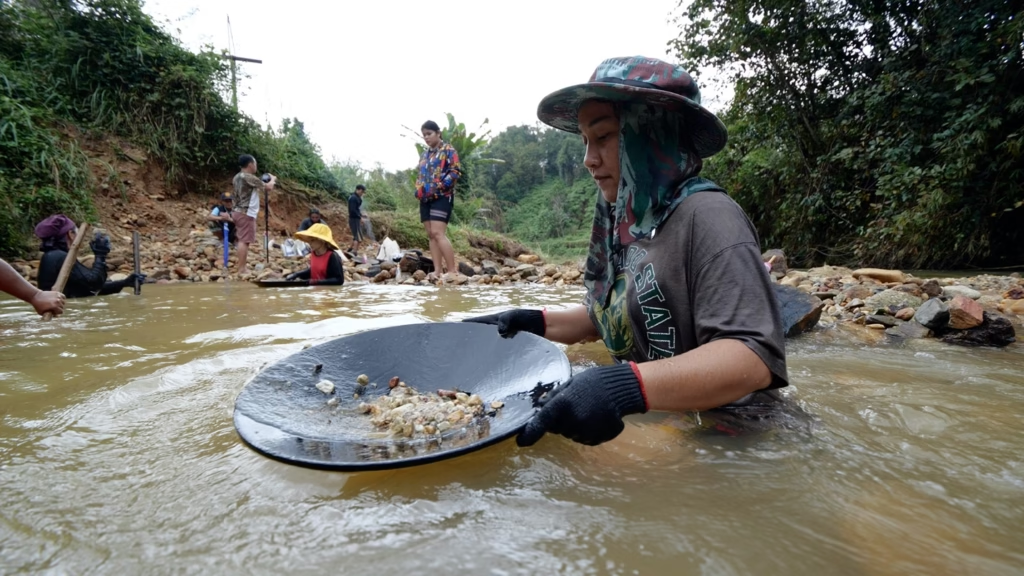
Modern Mining and Old Methods Side by Side
Not all Thai gold comes from pans in rivers. Large, modern mines share the stage with family-run operations that still use basic methods.
Chatree Mine: Industrial-Scale Gold
In central Thailand, the Chatree Mine in Phichit province sits as the country’s most prominent industrial gold project. This epithermal deposit, located along the border of Phichit and Phetchabun, is managed by Akara Resources and has been active since the early 2000s.
Geologists from Thailand and Australia discovered the site in the 1990s. Since then, the mine has produced more than 1.8 million ounces of gold and about 10 million ounces of silver. By 2025, annual output reached around 75,000 ounces of gold, making Chatree a major player within the volcanic Loei-Phetchabun belt known for low-sulfidation ore bodies.
Panompa: Small-Scale Mining Under Scrutiny
Close to this industrial activity, small-scale operations continue. In Panompa village, families such as that of Boonchu Tiengtan still work shallow pits by hand. They often find around one gram of gold per day.
However, some use mercury to bind the gold, a practice that concerns health experts. Mercury exposure can affect both miners and nearby communities, and has attracted attention from officials and public health advocates who worry about long-term impacts.
Northern Gold Belts and Local Fever
The northern regions of Thailand also hold rich geological zones where gold has gathered over long periods.
The Sukhothai Fold Belt
The Sukhothai Fold Belt stretches from Phrae to Lampang through Sukhothai province and hosts placer gold in several rivers and creeks. At Huai Yuak, pyrite-rich veins hint at deeper, yet unexploited resources. For now, however, only small-scale panning and limited exploration occur.
Wang Nua: A Short-Lived Rush
In 2012, Wang Nua district in Lampang province captured national attention. During the dry season, when water levels dropped, residents and fortune seekers flocked to the Wang River. They uncovered deposits that appeared to trace back to the slopes of Doi Luang National Park.
The excitement faded somewhat as easy pickings became rarer, but the local story lived on. Festivals in the area still draw crowds. Some events combine water fights in the Songkran period with friendly panning contests that celebrate the river’s glittering past.
The Legal Side: Who Can Pan for Gold in Thailand?
Thailand treats gold panning as a form of mining, which places it under national laws. Two key regulations shape how people can search for gold: the 2008 Enhancement and Conservation of National Environmental Quality Act and the Mineral Act.
Rules for Thai Citizens and Foreigners
For Thai citizens, small-scale panning by hand in public rivers, without machinery, usually does not require a formal mining licence. They can gather modest amounts as long as they respect general environmental rules and do not block waterways.
Foreign nationals face tougher restrictions. The Foreign Business Act classifies land-based extractive work as a restricted line of business for non-Thais. Prospecting for minerals falls under this category. In practical terms, this means foreigners cannot legally run independent gold panning or mining operations without specific permission.
Casual panning as part of a local tour is treated differently. When foreign visitors join guided trips, such as those in Bang Saphan, and do not plan to sell what they find, authorities tend to tolerate it. The activity counts as part of the touring experience, not as a commercial venture.
Independent foreign panners, especially those using tools beyond a basic pan or collecting more than a token amount, risk trouble. Officials can treat this as unauthorised mining, which may lead to fines of up to 100,000 baht, confiscation of equipment, or even deportation.
Taking Gold Out of Thailand
Another legal issue concerns exporting gold. Foreigners can buy standard Thai gold, typically 96.5 percent pure or about 23 karat, with no special limit based on nationality. The often-repeated rumour of a strict “5 baht” gold bar limit for foreigners has no basis in law.
However, moving gold across the border requires honesty at customs. Travellers must declare gold that exceeds the value of 20,000 baht to customs officials. Above that threshold, a duty of about 36.05 percent may apply. Failing to declare larger quantities can result in confiscation.
For jewellery, a VAT refund is only possible for purchases over 2,000 baht, and proper receipts must show where and when the item was bought. Experts often recommend that anyone planning serious panning or exporting of raw gold consult the Department of Mineral Resources or related agencies before making firm plans.
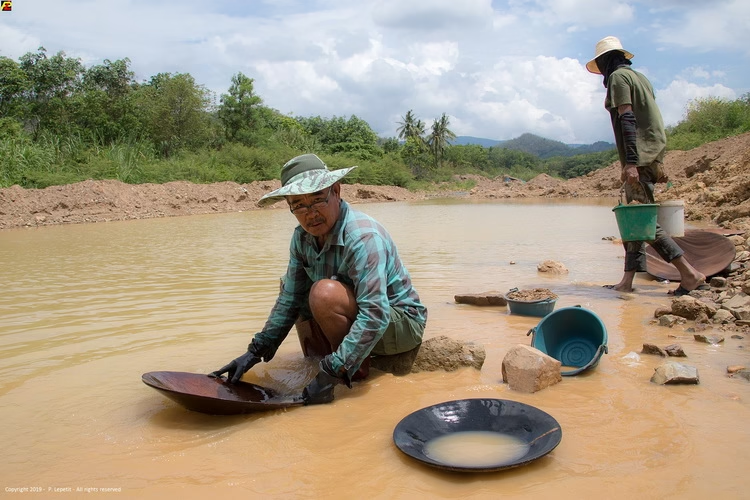
Gold Panning in Chiang Rai: The Northern Story
Now the focus turns to Gold panning in Chiang Rai, where history, geology, and culture meet, especially since this northern province borders both Myanmar and Laos, and forms part of the well-known Golden Triangle region, once more famous for opium than gold.
Doi Tung and the Loei Fold Belt Extension
Chiang Rai’s gold heritage is closely tied to Doi Tung and nearby areas such as Ban Pha Hee subdistrict. Surveys by Thai geologists have identified gold-bearing zones here that form part of an extension of the Loei Fold Belt. Placer deposits have been recorded in stretches of the Mae Sai and Kok Rivers, where heavy particles settle into bends, gravel bars, and slower pools.
While provinces such as Chanthaburi and Loei lead the country in large-scale production, Chiang Rai has its own quieter story. Most work here does not involve mines with heavy machinery. Instead, small groups and families pan by hand, especially among the Akha and Lahu communities. For them, panning holds cultural meaning and links to ancestry, not just income.
River Riches and New Risks
In Mae Sai district, the Kok River carries a reputation for hidden wealth. As a tributary of the Mekong, it flows through both Thailand and Myanmar. Some of the gold that locals find may originate from deposits on the Myanmar side, including upstream mines near Mong Hsat.
In 2025, worries about rare earth element contamination, along with traces of arsenic and cadmium tied to cross-border activities, caused concern. Health agencies issued alerts, and some planners became more cautious. Yet along certain stretches near Thaton and Chiang Saen, villagers still sift gravel with quiet persistence.
For a 66-year-old resident known as Pa Waen, the river remains both a blessing and a risk. Her workday often begins in rubber fields and ends at the riverbank, where she collects fine gold dust. She can sell it for around 1,900 baht per gram. As she puts it, “The river gives and takes,” echoing a sentiment heard in both southern and northern gold areas.
Gold Panning Tours in Chiang Rai
For visitors interested in Gold panning in Chiang Rai, the experience tends to be small-scale, intimate, and guided rather than heavily organised. In some places, people still pan informally, but for foreigners, joining an official tour is the safer path from a legal and practical viewpoint.
Eco-tour operators based in Chiang Rai city offer single or multi-day trips that range between 1,500 and 3,000 baht per day. These packages usually include:
- Transport to selected streams, often in Mae Chan or nearby districts
- Use of pans and other basic tools
- Guidance from local planners or guides
- Simple meals or snacks
- A homestay experience with Hmong or other hill tribe families, in some cases
During one such outing in 2024, a British expat managed to gather about 0.2 grams of gold. It was not enough to pay for the trip, but enough to frame or set into a piece of jewellery as a personal memento. As he put it, the joy lay less in the money and more in the feeling of washing away sand until a flash of yellow remained.
Foreign participants who stay within organised tours avoid legal risks. Guides know where panning is allowed, keep activities away from sensitive zones, and help keep group behaviour within local expectations. On the other hand, solo excursions near protected areas such as Doi Luang National Park can draw attention from park rangers and may lead to warnings or fines.
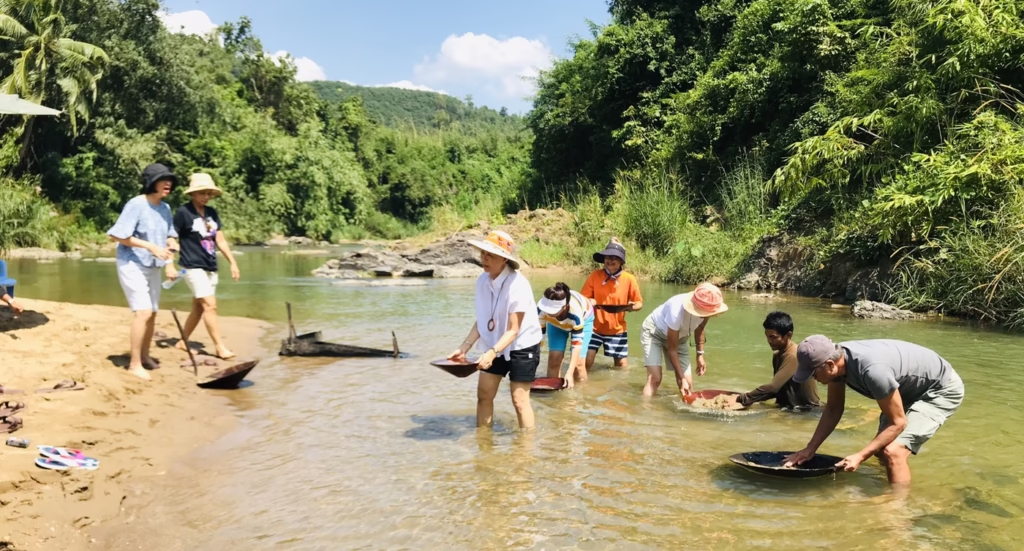
Challenges Facing Thailand’s Gold Panners
Gold panning in Chiang Rai and across Thailand sits at the meeting point of economics, culture, and the natural environment. Several problems already shape its future.
Climate change affects river levels and flow patterns. Longer dry spells can reduce the amount of water available for panning and harm crops that many panners also depend on. Sudden heavy rains can transform gentle streams into floods, making work impossible and sometimes dangerous.
Gold prices also rise and fall with global events. A jump in prices can bring more people to the rivers, placing pressure on local ecosystems. A sharp fall can leave families who invested in tools or gave up other work scrambling to adjust again.
Border tensions and ethnic conflicts near Myanmar and Laos occasionally spill over, affecting parts of Chiang Rai. Safety concerns can deter tourists and put pressure on cross-border trade that supports local markets.
Despite these difficulties, many communities see reasons to continue. For some, gold panning is woven into their identity. For others, it offers a flexible way to top up income when crops fail or tourism is slow.
Tourism, Culture, and the Story in the Sediment
The Tourism Authority of Thailand has started to promote “gold heritage trails” that connect panning spots with other cultural sites. In Chiang Rai, this might include Doi Tung’s royal project, which turned opium fields into sustainable farms, as well as hill tribe craft centres where visitors learn about weaving, silverwork, and local customs.
When travellers learn how local gold panning works, they often gain more than a few glints of metal. They hear about grandparents who taught the technique, see how children watch from the bank, and understand how the river shapes both income and belief.
One village elder summed it up by saying, “Gold is not just metal; it is our story settled in the sand.” The grains at the bottom of a pan hold pieces of geology, history, and daily struggle all at once.
Final Thoughts: Respecting the Rivers and the Rules
From Sukhirin’s jungle-clad streams in the south to the cool highland waters used for Gold panning in Chiang Rai, the search for gold captures imagination across Thailand. It offers hard work, hope, and a closer bond with flowing water and mountain soil.
For Thai citizens, careful planning can bring small but meaningful gains. For foreign visitors, the best path lies in joining guided activities, respecting local rules, and treating any gold found as a memory rather than a business opportunity.
Those who happen upon a few bright specks should remember to declare larger amounts at the airport, keep receipts for jewellery, and seek advice before turning a hobby into a serious operation.
Gold panning may not make most people rich. It can, however, give a fresh view of Thailand as more than beaches and temples. For many, the slow swirl of a pan in a quiet river brings something just as rare as the metal itself: a deeper appreciation of the people and places that make the Land of Smiles shine.




